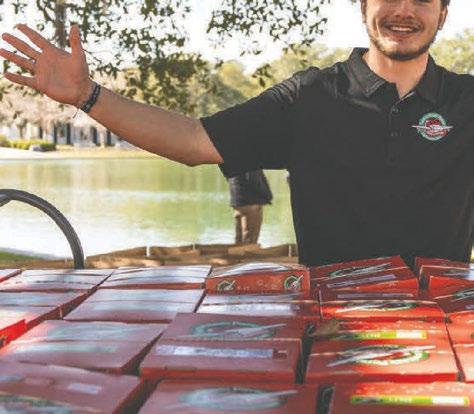

























A Charleston Southern degree will put you ahead and set you apart from the rest. Become a purpose-filled leader by combining what you love, what you’re good at, what the world needs, and what you’re paid for. At CSU, opportunity is discovered in community. Serious scholarship and real relationships lay a solid foundation for servant leadership. And, CSU is one of the smallest universities competing at the highest level in athletics — NCAA Division I. Declare your purpose today and choose from more than 80 undergraduate, graduate, and doctoral programs to reach your full potential at CharlestonSouthern.edu.















Jason Thomas, executive editor jthomas@scbiznews.com • 864-568-7570
Ross Norton, managing editor-content rnorton@scbiznews.com • 864-642-5229
Hollie Moore, sta writer hmoore@scbiznews.com • 336-682-2700
Steve McDaniel, editor Custom Publishing Division smcdaniel@scbiznews.com • 843-628-4744
South Carolina’s Media Engine for Economic Growth
Scott Warofka, associate publisher, SC Biz News swarofka@scbiznews.com
Sales
Ryan Downing, director of sales rdowning@scbiznews.com • 864-867-1928
Amanda Alford, multimedia account executive aalford@bridgetowermedia.com • 843-849-3109
Tony Rossi, multimedia account executive trossi@scbiznews.com • 864-867-1920
Coco Judd, multimedia account executive cjudd@nopg.com
Accounting ar@bridgetowermedia.com
Subscription Services service@bridgetowermedia.com • 877-615-9536








Source: Giving USA $374.4 BILLION


BILLION
$103.53 BILLION





IT’S OUR PLACE TO MAKE A DIFFERENCE
Our role in the community goes beyond banking. South Carolina is our home, too. Through volunteering in our neighborhoods, supporting local nonprofit organizations, and awarding college scholarships, we take pride in embodying the credit union motto, “PEOPLE HELPING PEOPLE.”
The Association of Fundraising Professionals SC Lowcountry Chapter will honor local changemakers at the National Philanthropy Day celebration, slated for Tuesday, Nov. 12, at The Porter Room at Holy City Brewing in North Charleston.
“The nonprofit community in the tri-county area makes a positive impact in the lives of thousands every day, and we want to recognize those who’ve stood out over the last year,” said Brett Wadford, AFP SC Lowcountry Chapter President and Chief Partnerships Officer at the Center for Heirs’ Property Preservation.
This year, the chapter is proud to recognize the following awardees:
• Individual Philanthropist of the Year: Tony & Linda Bakker and Family
• Corporate Philanthropist of the Year: Crews Subaru of Charleston
• Future Philanthropist Award: Daniel Island Kids
• Fundraising Professional of the Year: Awarded posthumously to Catherine Brack, American College of Building Arts
• Volunteer of the Year: Jeanne Taylor, Jeanne Taylor Photography
In addition to the Honoree Reception, the afternoon-long celebration will feature a 90-minute educational workshop and one-hour volunteer activity to benefit Charleston Animal Society. This year, Blackbaud will return as Presenting Sponsor of the event. Additional sponsors include Bishop Gadsden, Coastal Community Foundation, MUSC and Trident United Way.
“National Philanthropy Day is truly a celebration of the people and organizations who are doing good, and we hope the community will take part in celebrating those who are making an impact,” Wadford said.
To purchase tickets, or become a sponsor, please visit https://bit.ly/NationalPhilanthropyDay24.
Tony and Linda Bakker established the Bakker Family Fund in 1999 to provide grants to charitable organizations in and beyond the Lowcountry of South Carolina. To date, the Bakker Family Fund has awarded substantial gifts to organizations committed to making a difference. Together with their children James and Katy, Tony and Linda are passionate about giving back to their community.

AFP LOWCOUNTRY CHAPTER NATIONAL PHILANTHROPY DAY
2024 AWARD RECIPIENTS
INDIVIDUAL PHILANTHROPIST
Tony and Linda Bakker and Family
CORPORATE PHILANTHROPIST
Crews Subaru of Charleston
FUTURE PHILANTHROPIS
Daniel Island Kids
FUNDRAISING PROFESSIONAL
Catherine Brack
VOLUNTEER
Jeanne Taylor
2024 AWARDS CEREMONY
When: 5-7 p.m., Tuesday, Nov. 12
Where: The Porter Room at Holy City Brewing, 1021 Aragon Ave., North Charleston
Tickets: Available online at bit.ly/ NationalPhilanthropyDay24
For more information and to see a list of past winners, go online to www. afplowcountry.afpnet.org.
Crews Subaru is a locally owned auto retailer that truly believes in giving back through various “Share the Love” campaigns. Robert Crews began his ownership journey with Saturn of Charleston, adding Subaru to the lineup in 2009 and Chevrolet in 2010. The affiliation with Subaru was a natural fit, with the Subaru Love Promise commitment to serve the community and customers. Crews Subaru has been recognized for excellence many times, both nationally and locally. Crews Subaru local charity support goes to many organizations including Charleston Animal Society, Ronald McDonald House Charities of Charleston, the Lowcountry Food Bank, Jean’s Angels, Red Cross Blood Drives, Pet Helpers, Hallie Hill Animal Society, Leukemia and Lymphoma Society, three Meals on Wheels operations, Charleston County Parks and Recreation, Joint Base Charleston Force Support and more.
The Daniel Island Kids are proving that no one is too young to make a difference. Their “Flocking for Wishes” campaign, launched in memory of wish alum Charlie Peary, has raised over $62,000 to support Make-A-Wish in just two summers and has granted life-changing wishes to eight critically ill children across the Lowcountry. The campaign’s inspiration was Charlie, a young boy who wished for a party with his friends, calling it “Charlie-Palooza.” Sadly, he passed away shortly after his wish was fulfilled. To honor Charlie’s joyful spirit, his family and the Daniel Island community started Flocking for Wishes, a campaign that brings bright pink flamingos to neighbors’ lawns, spreading smiles and raising funds to grant wishes to children like Charlie.
Catherine Brack stressed the importance of building deep relationships with donors, students, and friends–throughout her life. She died in July after a six-year fight with breast cancer. Throughout her three decades in fundraising, Brack offered development, strategic planning, and project management and created highly effective fundraising events. From working with national organizations to running a successful consulting firm in Washington, D.C., Brack eventually made her way to the Lowcountry. In Charleston, she volunteered with several organizations and worked with the Charleston Gaillard Center, Charleston Library Society, and most recently the American College of the Building Arts. After moving here a few years ago to be close to family, she also served as an adjunct professor at the College of Charleston’s School of Arts Management where she taught future arts leaders important fundraising skills.
Jeanne Taylor is a local pet photographer who, in addition to private clients, works closely with a number of our local animal shelters and rescues, photographing adoptable pets and hosting photo fundraisers. Jeanne is first in line when it comes to donating her time to raise funds for area shelters, as well as advocating for spay-neuter services and pet adoptions. An Artist Member of HeARTs Speak since 2012, she averages photographing between 500-600 adoptable animals per year, which not only gets these animals adopted but increases donations as well. Taylor has proudly served pets and their people in the Charleston area, earning multiple awards as well as having her photographs featured in countless area publications.




At Trident United Way, our mission has always centered on creating a brighter future for our region by addressing the interconnected issues of education, financial stability and health. For many years, we have operated under this three-tier focus, recognizing the importance of a holistic approach to community well-being. However, as we continue to adapt and respond to the evolving needs of our community, we have made the strategic decision to transition to a singular focus on financially stable families.
This decision did not come lightly. We have spent countless hours over the last year engaging with community members and stakeholders and sourcing data to understand the root causes of the challenges facing families in the Tri-County region. What we discovered was that financial stability is not just a portion of the issue; it is the fundamental cornerstone that affects every aspect of a family’s life, including education, health outcomes and so much more.
One striking finding from the recent United for ALICE® report is that over 53% of children in South Carolina live in households experiencing financial hardship. ALICE is an acronym that stands for Asset Limited, Income Constrained, Employed, describing the sector of the population that struggles with financial stability despite one or more adults in the household being employed. This statistic includes 19% of families below the Federal Poverty Level and an additional 34% above it, highlighting the complexities many families face in securing support. Alarmingly, 75% of Black children, 72% of American Indian/Alaska Native children, and 66% of Hispanic children are living in households experiencing financial hardship. Furthermore, 35% of households with two adults in the labor force still fall below the ALICE threshold, illustrating that having working adults does not guarantee financial stability.
The transition to a single focus on financial stability allows us to concentrate our resources, energy and expertise more effectively.
Achieving and maintaining financial stability encompasses a range of barriers, including access to quality employment, affordable housing and financial literacy. By addressing these related elements, we can help families build a solid foundation that enables them to thrive. This

focused approach will also allow us to better measure our outcomes and adjust our strategies based on the data we gather. These elements are not isolated; they interconnect to create a foundation that enables families to thrive.
Many families in our community are faced with impossible choices — deciding between repairing a car essential for work or paying a medical bill. This is not just a statistic; it reflects the real struggles of parents juggling multiple jobs just to put food on the table. Our focus on financial stability aims to address these fundamental challenges directly.
Transitioning to this new focus does not mean we are abandoning our commitment to the education and health of our neighbors. Instead, we will work more intentionally with community partners in those sectors. We recognize that education and health are critical components of financial stability, and our aim is to create synergies that enhance our collective impact.
We will depend on our partnerships to take this journey with us. By collaborating with educational institutions, we can ensure that job training programs are aligned with the skills needed in our local economy. Similarly, by partnering with health organizations, we can provide families with the resources they need to maintain both their physical and financial health. Together, we can create a unified approach that empowers families and strengthens our community.
A key aspect of our transition is the importance of engaging the voices of those we serve. We cannot do this important work alone; the key to success lies in our community working together toward this goal. Financial stability is a personal and often sensitive issue, and we want to ensure that our strategies are informed by the lived experiences of community members. Through focus groups, surveys and open forums, we will gather insights that will guide our initiatives and ensure that we are meeting the real needs of families.
As we embark on this journey, I am filled with optimism about the potential for change. The commitment to financial stability is not just about numbers; it’s about empowering families to break the cycle of financial instability and create opportunities for future generations. Our goal is to build a community where everyone has the necessary resources and support to achieve their financial goals.
In closing, we invite you to join us in this endeavor. Whether you are a community member, partner organization or stakeholder, your involvement is crucial. Together, we can create a more equitable and prosperous future for all families in the Tri-County region, particularly those living under the ALICE threshold.
Thank you for your continued support as we take this significant step forward.
By Hollie Moore Staff writer, SC Biz News
Philanthropy risks becoming a passion of a past generation as Charleston changes and donors continue to recover from COVID-19’s lasting impact.
According to a study from The Giving Institute and Giving USA Foundation, in 2022 the total amount raised by nonprofits declined 8.4% from the previous year, falling by another 2.1% in 2023.
Jim Bush began his journey with fundraising as a college student in 1991. Twenty years later, he joined the Winkler Group, rising from a consultant to his current CEO position.
The Winkler Group is based in Charleston, but works nationally to help organizations to strategize, plan and execute campaign plans for fundraising.
After about 30 years in the fundraising industry and over 20 years in the Charleston region, he has seen the fluctuation of donations to nonprofits in the area.
“A lot of nonprofits want to do campaigns that are well beyond what their donors are willing to fund,” Bush said. “Donors don’t often feel as compelled to give as the nonprofit thinks that they perhaps should, and I think that is a big part of what this generosity crisis that we are in is really all about.”
After the COVID-19 pandemic, donors consolidated the number of organizations they want to support from four or five nonprofits to about two or three nonprofits. Winkler is often hearing from donors that “organizations treat them more like an ATM,” when they want to feel more like “insiders,” Bush said.
Bush has noticed that some of the elements that potentially play a role in donors’ deviation from traditional non-profit funding include an increased interest in spending money on trips and travel after the COVID-19 pandemic, as well as increased opportunities for individual crowdfunding during times of need rather than giving those funds towards an organization.
Bush says a few solutions to these issues in fundraising revolve arounda few things. First: changing the tax laws. In 2017, the Tax Cuts and Job Act was implemented, affecting everyday donors to where some now are not making enough money to itemize charity, Bush said.
Second: Bush says that nonprofits should be doing a better job of deeply connecting, or “radical connecting” as he calls it, with their donors.

“When we really connect with our donors and treat them like investors and partners, amazing things happen,” Bush said. “It has been my biggest joy to see those connections take place… to watch the lifelong relationship and partnership that comes out of that is so truly a blessing.”
Lastly, Bush believes that the fundraising industry is developing a high turnover rate in workers. People are leaving because “they are burnt out, the pay is low and the job is really hard,” he said.
Winkler Group focuses on sectors of non-profit fundraising in affordable housing and homelessness, food, ministries, cultural and land preservation, and education from public schools to higher education institutions. Bush said the goal fundraising for different organizations campaigns can range from $1 million to $1 billion, each with a different level of service needed from Winkler.
One organization the group works regularly with is the Sea Island Habitat for Humanity in the Charleston region. The organization depends heavily on individual donations as one of their main sources of funding, said Emily Speck, the director of development for the nonprofit.
Previously, Speck worked in Colorado for Girl Scouts of America where she saw a lot more corporate funding. She said a lot of reliance comes from being in a population that can typically afford to give philanthropically, such as Kiawah Island and Seabrook Island.
Speck said that individual donors for organizations such as hers are more desirable to
create a more stable relationship, as opposed to grants and foundations who are more likely to change their focus areas. Sea Island is typically receiving about $100,000 per year in grant funding versus closer to $800,000 from donors, she said.
For Sea Island, the level of funding received is less an issue than the number of donors returning to give, leading them to depend on donors to stretch those gifts, Speck said.
“Philanthropy is kind of like riding a bike,” Speck said. “We lost a lot of people during COVID, and if we can get them either back out volunteer on a job site, or coming to one of our events, or meeting a homeowner and actually seeing our mission in action, it sparks that back up.”
The Giving Institute and Giving USA Foundation also reported that from 2019 to 2021, volunteering numbers dropped 7%, a number they said was expected to rise after COVID-19 setbacks.
Additionally, Speck said a lot of the struggle comes from trying to inspire the next generation of giving as the current generation ages out.
“We haven’t found the solution yet but trying to find that sweet spot of how do we build this next generation of supporters, and by doing that through meeting their direct need and seeing what is it that will spark them and get them going,” Speck said.
Though there are next generations of families which have historically been philanthropic, the growth of Charleston and the people who are moving into the area begin to be a new focus, Speck said.
By Trident United Way staff
As we approach the season of giving, it’s vital to reflect on the transformative power of philanthropy in our community. At Trident United Way, we’ve seen firsthand how collective efforts can drive significant change, and I want to share insights on why collaborative giving is not just beneficial, but essential for the growth and well-being of the Tri-County.
Data from the most recent United for ALICE® report reveals that 39% of our TriCounty households—totaling over 131,800 families—are facing financial hardship. These families work hard yet struggle to make ends meet as the cost of living continues to rise, often outpacing earnings. The COVID-19


pandemic exacerbated these issues, amplifying vulnerabilities in our systems and highlighting the struggles of historically marginalized communities. Now, more than ever, we must come together to address these challenges headon.
If you’re not familiar with ALICE, it is an acronym that stands for Asset Limited, Income Constrained, Employed that represents those who earn above the Federal Poverty Level but not enough to afford all of their basic household necessities such as housing, food, childcare and healthcare.
For instance, a family of four consisting of two adults and two young children in Charleston County needs to earn roughly $89,000 annually just to cover these essential needs. In both Berkeley and Dorchester counties, the required salary for that same family of four is just over $85,000.


One of the most effective ways to make a difference in our community is through unified giving. When individuals, businesses and organizations unite, we can pool resources, share expertise and create initiatives that have a farreaching impact. The approach allows us to tackle issues at their root, rather than just treating the symptoms.
A key component of Trident United Way’s mission work is our Changemaker Grants, which are reviewed and recommended by a panel of trained community volunteers. These grants vary by fiscal quarter and offer funding for a number of programs and resources to local nonprofits in our area. In particular, our Capacity Building grants have received overwhelming interest and response from the nonprofit community. These grants empower local nonprofits by enhancing their internal functions and capabilities, enabling




them to serve our community more effectively and efficiently. By investing in organizations that understand the unique challenges of our area, we create a stronger safety net for those facing hardship.
Another example of unified giving action is the ongoing partnership between Trident United Way and the Coastal Community Foundation. Together, we have launched a joint fund to assist residents impacted by major storms and coastal flooding. By coordinating our efforts, we’ve streamlined resources to ensure support reaches those in need more efficiently.
This combined approach of collaboration and capacity building amplifies impact, making it possible to address complex issues with innovative solutions.
The future of philanthropy lies in engaging younger generations. According to a study by PG Calc, 74% of Millennials and 63% of Gen Z respondents express a strong desire to make a positive impact through their giving. They prioritize transparency, accountability and community engagement. By fostering a culture of giving that resonates with these values, we can inspire a new wave of donors committed to making a difference.
Trident United Way is actively working to create opportunities for young philanthropists to get involved, whether through volunteerism, fundraising campaigns or educational programs that highlight critical needs in our community and the importance of giving back. By involving young philanthropists in meaningful ways, we not only empower them with the data and information to understand the needs they are supporting, but we also ensure the longevity of their philanthropic efforts.
As we encourage unified giving, it’s also important to recognize that lasting change doesn’t happen overnight. It requires commitment, persistence and a willingness to adapt to the evolving needs of our community.
Trident United Way leverages nationally recognized data sources, such as United for ALICE®, to guide and enhance our efforts. This approach allows us to identify the most pressing needs in our community and adapt as those needs evolve. For example, a recent United for ALICE report reveals that 53% of children in South Carolina reside in financially insecure households. This situation is particularly concerning for families with very young children, with 60% of families with infants and toddlers facing financial hardship. Regularly updated data such as this provides a window into the most current needs of our community and informs our work almost immediately, impacting where we issue grant funds, or where we allocate donor dollars directly into the community.
As donors, it’s crucial to look beyond one-time contributions and consider sustained support for programs and organizations that align with your values and the needs of your community.
As 2024 comes to a close, I invite you to consider how you can contribute to our Tri-County’s growth and resilience. Whether through financial support, volunteerism or simply spreading the word about the work being done in our community, every action counts. Together, we can harness the power of unified giving to create a brighter future for all our neighbors.
Let’s work hand-in-hand to uplift all Tri-County families, fostering a community where everyone has the opportunity to thrive, because UNITED is the way forward.














Advertise with Charleston Regional Business Journal And Grow Your Business The B2B landscape is


An actively engaged audience across email, web, social, print and events.

Whether your goal is to increase brand awareness, sell product, or capture high-quality leads, our experts can custom tailor an advertising program with the right audience, message, timing and budget. Remind and reinforce your message across multiple channels, including:





































To be a relentless force for a world of longer, healthier lives.
NAME OF YOUR ORGANIZATION:
American Heart Association
MISSION STATEMENT: To be a relentless force for a world of longer, healthier lives.
YEAR ESTABLISHED LOCALLY: Charleston office in 1990, nationally founded in 1924.
TOP LOCAL EXECUTIVE: Katie Schumacher, executive director CONTACT INFORMATION:
887 Johnnie Dodds Blvd., Suite 100 Mt. Pleasant, SC 29464
EMAIL: CharlestonSC@Heart.org
WEBSITE: Heart.org/SouthCarolina
AVERAGE NUMBER OF VOLUNTEERS IN 2024: 1,700 +
TOTAL OPERATING BUDGET (2024-2025):
$2.5 million
PERCENT OF REVENUE DEDICATED TO PROGRAM SERVICES:
80 cents of every dollar goes back to fund several programs, such as innovative and lifesaving research, critical education programs, advocacy and lifesaving CPR trainings in the Lowcountry GEOGRAPHIC AREA OR SPECIFIC POPULATION SERVED: We are honored to serve Berkeley, Dorchester and Charleston counties.
GREATEST NEED:
We all hope for a world of longer, healthier lives. To overcome today’s biggest health challenges and accelerate that future, each of us needs to be part of the progress. Since the AHA’s founding in 1924, deaths from cardiovascular diseases have been cut in half. And yet, there are still so many lives to be saved. By driving breakthroughs in science, policy and care, together, we can continue to advance health and transform lives every day. Join our movement to change the future of health and be the progress that ensures longer, healthier lives for all.
Our local American Heart Association positively affects the Lowcountry community’s health in many ways:
• We are present in every hospital where doctors save lives with technology developed from AHA funded research.
• Patients benefit from our Get with the Guidelines quality programs.
• We work with companies to create healthier workplaces.
• We bring resources and education to our community about blood pressure control through community collaborations like our blood pressure cuff loaner program in all Charleston County Libraries.
• 110 schools in the Charleston area participated in American Heart Association’s Kids Heart Challenge initiatives to improve students’ health and well-being. We are committed to CPR education and creating a National of Lifesavers through:
• Our interactive Hands-Only CPR training kiosk at the North Charleston Coliseum.
• The CPR in Schools kits we’ve placed in Charleston County School District high schools.
• The Telecommunicator CPR policy that we advocated for, which requires all South Carolina 9-1-1 operators to be trained in T-CPR and be able to provide detailed instructions over the phone.
We want to expand our financial support, grow our volunteer base, engage our community in creating a healthier environment, train more people in hands-only CPR, educate others to know their numbers, and advocate for laws that will create a healthier community. We encourage everyone in the Lowcountry to join our Nation of Lifesavers, our movement to turn bystanders into lifesavers, so that in the event of cardiac emergency anyone, anywhere is prepared and empowered to become a critical link in the chain of survival and provide CPR. Together we can save lives.
By 2030 we want to double the survival rate of cardiac arrest, but we can’t do it alone. To reach this goal, we need:
1. More communities and organizations with Cardiac Emergency Response Plans
2. To raise awareness and train more people in CPR
3. More access to AEDs and training in our communities
FUNDRAISING EVENTS:
LOWCOUNTRY HEART WALK
February 22, 2025
LowcountrySCHeartWalk.org
CHARLESTON HEART BALL
April 25, 2025
Heart.org/CharlestonSCHeartBall
GO RED FOR WOMEN LUNCHEON
May 22, 2025
Heart.org/CharlestonGoRed
CORPORATE GIVING OPPORTUNITIES:
The American Heart Association accepts donations throughout the year. You can fund our lifesaving mission by supporting customized sponsorships that are centered around CPR initiatives, blood pressure, workplace wellness, and many more. You can also sponsor our events: The Lowcountry Heart Walk, Charleston Hard Hats with Heart, Charleston Heart Ball, and the Go Red for Women Luncheon. Email CharlestonSC@Heart. org to find ways to get involved in building a healthy community.

Lowcountry Food Bank serves more than 200,000 food-insecure neighbors every year in the 10 coastal counties of South Carolina.
We do this critical work with the help of nearly 240 partner agencies and community partners - a network of food partners, on-site meal programs and school programs.
Our dedicated staff provides our partners with fresh fruits and vegetables, nutrition education, and the equipment needed to distribute healthy food to people in need.
To best serve our most vulnerable populations, we identify locations that drive our commitment to provide equitable access to nutritious food. We target our food assistance initiatives and programs to reach disproportionately affected communities, individuals and families. Here are a few statistics that show our impact in 2023:
42.8 42.8
Millions Pounds Of Food And Essential Items Distributed
35.6 35.6
Million Meals Served
18 18
Million Pounds Of Produce Served
34,000+ 34,000+ Volunteer Hours Worked
325,004 325,004
Miles Driven By LCFB Trucks

For more information call 843-747-8146 or visit
lowcountryfoodbank.org

15 15


Million Pounds of Food From
Retailers That Would Otherwise Go to Waste












To unite our community in pursuit of equitable, dignified, and consistent access to food.
NAME OF YOUR ORGANIZATION:
Lowcountry Food Bank
MISSION STATEMENT: To unite our community in pursuit of equitable, dignified, and consistent access to food.
YEAR ESTABLISHED LOCALLY: 1983. Lowcountry Food Bank celebrated its 40th anniversary in 2023!
TOP LOCAL EXECUTIVE: Nick Osborne, President and CEO
CONTACT INFORMATION: Brenda Shaw, Chief Development Officer
2864 Azalea Drive, N. Charleston, SC 29405
843-747-8146
Website: lowcountryfoodbank.org
CORPORATE GIVING CONTACT:
Brenda Shaw, Chief Development Officer 843-747-8146 ext. 104
E-mail: bshaw@lcfbank.org
AVERAGE NUMBER OF VOLUNTEERS IN 2023: More than 34,000 volunteer hours
TOTAL OPERATING BUDGET (2023-2024):
PERCENT OF REVENUE DEDICATED TO PROGRAM SERVICES: 96%
GEOGRAPHIC AREA OR SPECIFIC POPULATION SERVED: Lowcountry Food Bank serves the 10 coastal counties of South Carolina: Charleston, Berkeley, Dorchester, Williamsburg, Horry, Georgetown, Colleton, Hampton, Jasper, Beaufort
GREATEST NEED: Monetary donations to help create healthy meals. Every $1 donation helps create 5 meals for the neighbors we serve.
• In our 40th year of operations, we distributed a record-setting 42.8 million pounds of food, of which 18 million pounds was fresh produce. This translates to 33 million meals for the neighbors we serve.
• With the conclusion of our previous 5-year strategic plan, we developed a new strategy and moved to a 3-year, focus strategic framework, which seek to define our neighbors and communities by their assets and aspirations rather than by challenges and problems.
• Our retail program continued to grow, with about 15 million pounds of product rescued, which represents 38% of total food sources.
• Our partnership with the Gullah Farmer’s Cooperative Association continues to help address the underlying causes of hunger and food insecurity by increasing the capacity of local farmer-led producers and their ability to access the wholesale food market.
• Post Covid, we have maintained consistent revenue across many of our different fundraising channels for Chefs’ Feast, our LCFB Foundation, Hunger Action Month, and Giving Tuesday.
• We continue to focus on developing the capacity of our partner agencies and food pantries to best serve our neighbors.
• Construction is well under way of our new 20,000 square-foot Southern Region facility in Hampton County to serve our neighbors even better in the southern portions of our state.
Nutritious food for today; engaging with our neighbors and communities to amplify the voices of those we serve; investment in the future of our communities by cultivating partnerships and developing greater capacity for our partner food pantries; and organization excellence and investment in our own core to best serve our neighbors.
• Chefs’ Feast: Our yearly event to raise funds for our programs that fight childhood hunger, the 2025 Chefs’ Feast is scheduled for February 23, 2025.
• Walk to Fight Hunger: This annual familyfriendly event aims to bring awareness to hunger issues and raise funds for LCFB programs.
• Giving Tuesday: A global giving movement and the opening day of the holiday giving season.
CORPORATE GIVING OPPORTUNITIES:
• Fund a specific Lowcountry Food Bank program or sponsor an awareness campaign.
• Sponsor and attend Chefs’ Feast, our premier gala fundraising event in February.
• Challenge your customers and employees to give to the Lowcountry Food Bank through your company’s annual employee giving campaign.
• Volunteer with your team at the Lowcountry Food Bank
• Host a food & fund drive
• Provide in-kind donations to the Lowcountry Food Bank by donating products for professional services.

MISSION - Trident United Way is a catalyst for measurable community transformation in education, financial stability and health. VISION - To be the leader in uniting our community to improve lives. Trident United Way
NAME OF YOUR ORGANIZATION:
Trident United Way
YEAR ESTABLISHED LOCALLY: 1944 – we are celebrating our 80th year of serving our community.
TOP LOCAL EXECUTIVE: D.J. Hampton, II, J.D. – President and Chief Executive Officer
CONTACT INFORMATION:
Administrative Offices: 6296 Rivers Avenue, Suite 200, North Charleston, SC 29406
843.740.9000
Website: tuw.org
Other Trident United Way Locations: BERKELEY RESOURCE CONNECTION –Moncks Corner 843.761.6033
DORCHESTER TUW RESOURCE CONNECTION - Summerville Phone: 843.695.4261
CORPORATE GIVING CONTACT: Brooke Chhina, Director of Corporate Advancement 6296 Rivers Avenue, Suite 200 North Charleston, SC 29406 843.207.4213
E-mail: bchhina@tuw.org
AVERAGE NUMBER OF VOLUNTEERS IN 2024: 3,602 VOLUNTEERS SERVED MORE THAN 12,900 HOURS through Trident United Way in fiscal year July 2023 through June 2024.
TOTAL OPERATING BUDGET: $5,771,546 (FY 2022-2023)
PERCENT OF REVENUE DEDICATED TO PROGRAM SERVICES 58.23% (2022-2023 Program Operations from our most recent 990)
GEOGRAPHIC AREA OR SPECIFIC POPULATION SERVED: Berkeley, Charleston and Dorchester counties.
Despite working full-time or multiple jobs, 39% of Tri-County households struggle to make ends meet. That means nearly 4 OUT OF 10 NEIGHBORS CAN’T AFFORD ALL OF THE ESSENTIALS like food, housing, transportation and healthcare. In our state, 53% of the 1.1M South Carolina children live in households that cannot afford the basics.
MEET ALICE®. ALICE represents households who are Asset Limited, Income Constrained, Employed and represents the 131,809 TRICOUNTY HOUSEHOLDS that are employed. Despite earning above the Federal Poverty Level, (FLP = $30,000 annually per household) and less than $89,000 annually per household (2 adults, infant and preschooler), these hardworking households cannot afford life’s necessities due to factors beyond their control.
Trident United Way’s CHANGEMAKER GRANTS mobilized resources to local nonprofit dedicated to making a difference in our community. Through the four grant cycles, we awarded 29 GRANTS TOTALING $500,000 IN FUNDING.
Celebrated the first full year of FoodShare Berkeley County operations. This program aims to close the gap in access to fresh fruits and vegetables with plans to scale this “food as medicine”. Each FreshFood box contains 1012 varieties of fresh produce and is available for $5 with SNAP or $20 purchase with debit card. Free Tax Filing Assistance – in partnership with SC Thrive, supported clients with filing MORE THAN 1,000 TAX RETURNS AND SAVING AN ESTIMATED $294,000 IN FILING FEES AND $1.9 M IN TAX REFUNDS
2025 GOALS:
• After nearly a year of research, discussion and consideration, Trident United Way’s Board has voted to shift our mission work to a single focus: FINANCIALLY STABLE FAMILIES. In the coming months, Trident United Way’s Board of Directors will finalize a BOLD COMMUNITY GOAL based on community feedback and
create a strategic plan.
• Continue to share UNITED FOR ALICE data updates across the state of South Carolina. ALICE represents the Asset Limited, Income Constrained, Employed families and individuals. ALICE families make more than the Federal Poverty Level but fall below the ALICE Threshold. That threshold is an income at which individuals and families are not able to afford all of their basic needs (roughly $89,000 for a family of four in the Tri-County). This coalition seeks to reshape the narrative around struggling families by offering more accurate tools to measure the cost of living and reveal the real challenges faced by ALICE households.
FUNDRAISING EVENTS:
2024 is Trident United Way’s 80th year in service to the Tri-County community with a special event in early 2025. There will be multiple opportunities to support this event and invest in the mission-fulfillment work of programs and partnerships serving Berkeley, Charleston and Dorchester Counties.
CORPORATE GIVING OPPORTUNITIES:
• Transformative gifts for capital improvements and expansion of services in three counties.
• Emergency Response – health, shelter, bill pay, rent, utilities, food and more.
• Employee giving campaigns through payroll deduction or e-pledge.
• Volunteer connection/service opportunities.
• New for 2024/2025 Corporate Partnership Program: Corporate brands receive increased brand exposure benefits and support community engagement activities to enable donor funds to remain focused on impact programs and grants. Partnership opportunities begin at $2,500 annually with premiere opportunities for investments of $25,000 and beyond annually.
• Customized giving and volunteer opportunities to meet corporate social responsibility goals. Please contact Brooke Chhina at bchhina@tuw.org or 843.207.4213 for more information.





As more people connect with water, wildlife and wild places, the future of our planet looks brighter and more sustainable. Connecting thousands of learners to the wonder of water, wildlife and wild places takes a robust network of support.
Thanks to a generous gift from Bosch, our South Carolina Aquarium virtual programs have reached more learners of all ages than ever before! Their support funds invaluable virtual field trips, events, STEM programming and more that enables students throughout South Carolina to connect with the natural world, regardless of location.


You can help expand education offerings to even more students across the state. Explore corporate opportunities at the South Carolina Aquarium by calling (843) 579-8600 or by visiting scaquarium.org/corporate






Our mission is to inspire conservation of the natural world by exhibiting and caring for animals, by excelling in education and research and by providing an exceptional visitor experience. The South Carolina Aquarium is a 501(c)(3) nonprofit organization. We rely on the support of our paying guests, members, foundations and the generosity of our donors.
YEAR ESTABLISHED LOCALLY: 2000
TOP LOCAL EXECUTIVE: Kevin Mills, President and CEO
CONTACT INFORMATION:
100 Aquarium Wharf, Charleston, South Carolina 29401 843-577-FISH (3474)
Website: www.scaquarium.org
CORPORATE GIVING CONTACTS:
Griffin Muli, Manager, Corporate and Legislative Strategy
100 Aquarium Wharf, Charleston, South Carolina 29401 (843) 579-8600
E-mail: gmuli@scaquarium.org
AVERAGE NUMBER OF VOLUNTEERS IN 2023: 320
TOTAL OPERATING BUDGET (2023-2024): $17,612,305.19
PERCENT OF REVENUE DEDICATED TO PROGRAM SERVICES: 75% GEOGRAPHIC AREA OR SPECIFIC POPULATION SERVED:
In 2023, the Aquarium welcomed more than 515,000 visitors from around the world. Beyond our walls, we drive innovation in the areas of conservation and research through fieldwork and global education outreach. Our education programs reach students through virtual programs, education outreach and handson learning opportunities.
GREATEST NEED:
Aquarium education programming is on the cusp of a major expansion beginning in late 2024 and corporate support is integral to our growth. As the Aquarium prepares to double the number of students we serve each year, exciting opportunities are available to bolster our education programs.
The South Carolina Aquarium Sea Turtle Care Center™ continues to provide innovative, lifesaving care for sick and injured sea turtles. So far in 2024, the Aquarium has released 35 rehabilitated sea turtles, with more than 430 total sea turtles released since its inception. Renovations for the Aquarium’s new multidisciplinary learning center, the South Carolina Aquarium Boeing Learning Lab at the Charleston Maritime Center, continues with an anticipated opening in early 2025. This facility will comprise 8,500 square feet of educational space that includes four indoor classrooms, one open-air classroom, a broadcast studio to conduct virtual programs and office space for Aquarium staff.
The Aquarium has always upheld the mission of providing accessible STEM education programs to students of all ages. With the opening of the Boeing Learning Lab in 2025, the Aquarium will have the capacity to double the number of students they serve annually through their core education offerings, such as Dominion Energy School Programs, the Aquarium’s free standardsbased curriculum for K-12 students and a robust slate of teen programming, including the High School Intern Program and Job Shadow Program. The opening of the Learning Lab represents the advancement of Landmark, the Aquarium’s five-year strategic plan which prioritizes unlocking and animating the waterfront for families, students, residents and tourists.
Sea Life by Starlight returns to the Aquarium on Saturday, December 7. This disco-themed 21+ fundraiser is all-inclusive, featuring a full bar, small plates, a silent auction, dancing and more to benefit the South Carolina
Aquarium Sea Turtle Care Center™. Stay tuned for our 25th anniversary celebration!
Advance your business’s philanthropic goals supporting STEM education, sea turtle rehabilitation, wildlife conservation and more by partnering with the Aquarium! From event sponsorships to Corporate Circle membership, we have numerous opportunities to complement your community engagement goals, complete with rewarding benefits for your employees. To discuss corporate giving opportunities, please contact Griffin Muli, manager, corporate and legislative strategy.



































